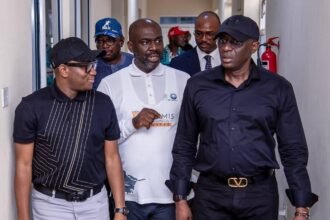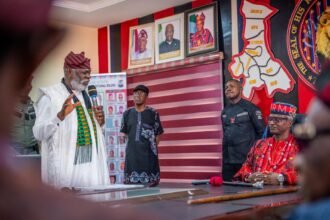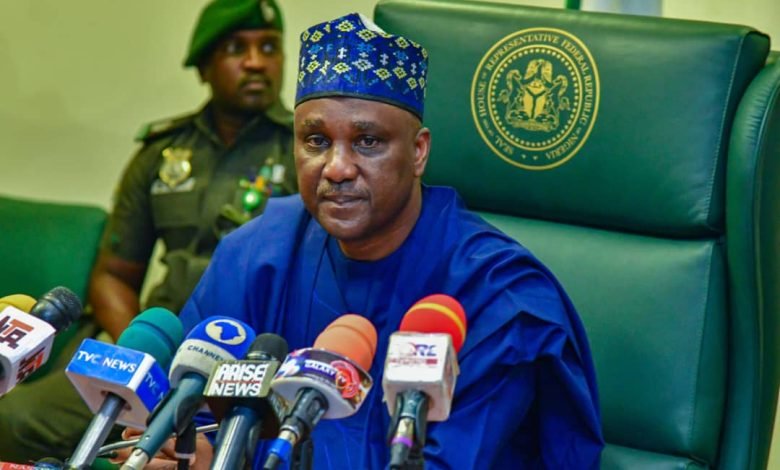……proposes pro-females Constitution, Police Act, Electoral amendments
The Speaker of the House of Representatives Rt. Hon. Abbas Tajudeen, Ph.D, on Friday, declared his agenda for women empowerment and inclusion in governance, as the world marks the International Women’s Day.
According to a press statement by Musa Abdullahi Krishi, Special Adviser on Media and Publicity, noted that the Speaker, in his closing address at a ceremony organised by the National Assembly to celebrate women, disclosed some of the plans he personally has for women, as well as those of the House, including amending the Police Act to be fairer to women and revisiting the gender-related bills that failed to pass in the last review of the 1999 Constitution by the 9th National Assembly.
“Critically, I am leading an amend to the Police Act 2022 to ensure uniformity in the enlistment requirements for men and women; amend the rule that excludes married women from enlisting in the police and delete the regulation that provides that unmarried women may only marry after they have served in the police for three years subject to approval from a police commissioner,” he partly said amidst cheers from the audience.
The United Nations had designated the theme for the 2024 edition of the International Women’s Day as ‘Invest in Women: Accelerate Progress.’
To commemorate the day, the Office of the Speaker spearheaded the event, which was attended by several female lawmakers, international bodies and the diplomatic community, actresses, civil society and advocacy organisations, women groups, and representatives of the private sector.
Speaker Abbas stated that the House is committed to working with the Executive arm to “create an enabling environment that allows women access finances for investment, take on leadership roles, excel in their chosen careers, and actively participate in national policy-making and dialogue.”
While acknowledging the need to take “drastic and intentional steps” to open up spaces for the inclusion of women in decision-making processes in different sectors, he said this would enable the nation to reap the benefits of the overall empowerment of women.
The Speaker noted that the Legislative Agenda of the 10th House outlines 12 actions to improve women’s political representation and participation. These, he said, include re-introducing and supporting the bill on temporary special seats for women in the Constitution amendment efforts of the 10th National Assembly; legislation to increase women’s representation in elective positions by creating special women-only seats in the Senate and House, and encouraging state Houses of Assembly to do the same.
Other are introducing electoral reforms to implement mandatory requirements for political parties to have a certain percentage of female candidates and in party leadership structure; and passing the Gender Equal Opportunities Bill (GEOB) to ensure women are active and equal participants in Nigeria’s political and decision-making processes.
Speaker Abbas added that the House would also work with political parties to provide legal backing to funding or subsidies specifically for female candidates to reduce the financial barriers to entry, as well as strengthen the Electoral Act 2022 to penalise violence, intimidation and harassment against women in politics.
He said: “These reform measures have been prioritised by the recently inaugurated House Committee on Constitutional Amendment, chaired by the Deputy Speaker, Rt. Hon. Benjamin Kalu. Undoubtedly, we can achieve these milestones with the early commencement of the process and involvement of the Executive and State Houses of Assembly.
“I call on all women’s groups and organisations to join this campaign and apply the needed pressure at all levels to ensure these reforms see the light of day. You are invited to submit memoranda to the House of these and related issues to provide us with the necessary insights required to develop home-grown solutions to enhance women’s political participation. I have already mandated a comprehensive brief on comparative practices across Africa and the world to guide our deliberations.”
At the internal level, the Speaker disclosed that the House is working to strengthen the women’s caucus in the House to better advocate for women-specific issues and mentor upcoming female politicians. “My office has also launched the ‘Bridge Her Gap Initiative,’ a project to address the systemic gaps and inequalities faced by women and girls in Nigeria,” he said, adding that in all these efforts, the House shall collaborate with government agencies, civil society, and the private sector, as “it is only through collective action that we can overcome the structural barriers preventing women from realizing their full potential.”
The Speaker commended all Nigerian women “who continue to brace the odds and succeed locally and globally,” saying, “We are very proud of you and hope to build on your resilience to open up more doors of opportunities for our women and girls to contribute more.”
The Deputy Speaker, Rt. Hon. Benjamin Okezie Kalu, while declaring the event open earlier on the Speaker’s behalf, said the theme of this year’s edition served as a clarion call for individuals, organisations, and all stakeholders to join hands and pave the path toward gender-inclusive governance. “The need for diversity and inclusion, particularly in terms of increasing women’s representation in government, is not just a statistical exercise; it is a fundamental democratic principle,” he stated.
He noted that while Nigeria boasts a thriving ecosystem of female-led businesses, the persistence of a significant funding gap had been identified. He said despite 41 per cent of Small and Medium-scale Enterprises (SMEs) being owned or led by women, less than 4 per cent receive financial support crucial for growth and sustainability.
He said: “In recognition of this disparity, my office is actively working to bridge the gap. Through strategic collaborations with innovation and tech organisations such as Meta (formerly Facebook) and AfriLabs, we intend to develop policies and facilitate stakeholder dialogues on strategies to increase financial inclusion for women entrepreneurs These strategies will culminate in the launching of proactive initiatives specifically geared toward the removal of barriers to financial inclusivity.
“My position as the Chair of the House Committee on Constitution Review strengthens our commitment to this cause. I urge the inclusion of gender inclusion and gender mainstreaming bill proposals within the 6th alteration process. Expediting these proposals through my office will ensure they receive swift and thorough consideration in the constitution review process.
“By combining legislative action with collaborative initiatives, we can unlock the immense potential of women in both the political and socio-economic spheres, thus propelling them to become the engines of Nigeria’s economic future.”
Gracing the occasion were President of the Senate, Senator Godswill Akpabio (represented); the First Lady Senator Oluremi Tinubu, represented by Mrs Ekaette Unoma Akpabio; wife of the Speaker, Hajia Fatima Tajudeen Abbas; House Deputy Majority Whip, Hon Adewunmi Oriyomi Onanuga; Chairman, House Committee on Women Affairs and Social Development, Kafilat Ogbara; Chairman, House Committee on Ethics and Privileges, Hon Tolulope Akande-Sadipe; Chairman, House Committee on Women in Parliament, Hon Fatiman Talba; and a member of the Commonwealth Parliamentary Association (CPA) and the Chairperson of the Commonwealth Women in Parliament (CWP), Africa Region, Hon. Zainab Gimba.
Others were Dean Emeritus, Faculty of Law, University of Nigeria (UNN), Nsukka, Prof Joy Ngozi Ezeilo; former Country Director, ActionAid, Ene Obi; and actresses, Tonto Dike and Eniola Badmus.
In attendance or represented were the Ambassador of the Kingdom of Netherlands to Nigeria; Ambassador to UN in Nigeria and ECOWAS; the Norwegian Ambassador to Nigeria, the UN Women; Konrad Adenauer Foundation (Konrad-Adenauer-Stiftung: KAS); Head of Cooperation, Government of Canada, Djifa Ahado; Resident Representative, UNDP, Elsie Attafuah; CEO, Neveah, Ibidapo Lawal, among others.





